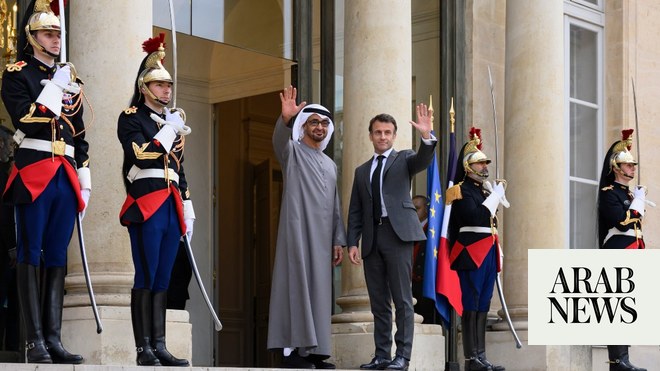
In May 2017, when Emmanuel Macron won the French presidential election with surprising ease, his clever use of social media to connect with voters and their concerns was credited as one of the principal reasons behind his victory. Less than 18 months later, the same social media has been used by his entirely disenchanted citizens to mount one of the most serious challenges to his presidency and policies, which are becoming increasingly unpopular.
Since last weekend, hundreds of thousands of ordinary French citizens, all wearing gilets jaunes (yellow reflective vests worn by drivers) have been organizing roadblocks all over the country to protest Macron’s decision to dramatically increase the tax on diesel and petrol from the new year.
Protests are not something he would normally worry about. Ever since he became president, Macron has stared down a series of organized protests, including a four-month strike by the railway workers’ unions.
He has seen off protests by other unions over his labor reforms, and pressure from teachers on his school reforms. In the face of stiff opposition from socialists and extreme-left parties, Macron has pushed through very controversial tax breaks for the 1 percent richest French.
A president who has managed to push through so many controversial measures in the face of stiff opposition should not be worried about yet another protest, especially one that lacks a leader, an existing organization or even funds. But the gilets jaunes protest has clearly unnerved Macron and his government, precisely because it is a spontaneous outpouring of anger over his policies, which are seen by ordinary French as favoring only the richest.
The genesis of this movement is still unknown. Ever since crude oil prices began rising earlier this year, there has been mounting discontent in France. To add to the anger, the government announced an increase in tax on petrol and diesel from next year. The decision, says the government, was taken to curb carbon emissions and nudge the populace toward public transport and electric vehicles.
However, the timing could not have been worse. The French have been increasingly vocal about the very high prices at the gas stations, and the fact that taxes already make up over 60 percent of the price of fuel.
Since the announcement of a tax hike, several online petitions have asked for a reduction in petrol prices. These disconnected petitions fused into one large yet leaderless movement against the government’s policies.
But the extent of the popular rage caught everyone, especially Macron, by surprise, as on Nov. 17 more than 250,000 French women and men took to the streets to demand a reversal in the tax hike on petrol and diesel. Though the opposition, gleefully watching Macron finally hit a roadblock, has been prompt to offer support to the movement, so far it has remained free of any political leadership.
It may be time for Macron the president to replay the tapes from his campaign and learn from Macron the candidate the basics of communicating with the people.
Ranvir S. Nayar
The gilets jaunes marks yet another low point in Macron’s tumultuous tenure as president, and his return after the summer break has not been easy. An opinion poll in late August put his approval ratings at just 23 percent, a record low for French presidents and nearly two-thirds below his approval ratings at the time of his inauguration barely 15 months earlier, which were a record high.
His involvement in several unnecessary controversies — including a crude retort to an unemployed person looking for a job to “cross the road and find a job,” and the unsavory incident of his aide and bodyguard brutally beating a protester — have made the French rethink their opinion of their leader.
Macron’s ratings were trawling the bottom even before the gilets jaunes movement. It would hardly be a surprise if the government’s cold and distant handling of this movement costs him more points in terms of his ratings.
Such a sharp reversal in Macron’s fortunes is surprising. He became president by being able to identify with ordinary French people, and with their concerns and desire for a change in the political system.
But less than 18 months into the job, Macron seems to have lost his ability to communicate with common men and women, and is seen as totally out of touch with what the French want from him and his government. It may be time for Macron the president to replay the tapes from his campaign and learn from Macron the candidate the basics of communicating with the people.
• Ranvir S. Nayar is managing editor of Media India Group, a global platform based in Europe and India, which encompasses publishing, communication, and consultation services.
Disclaimer: Views expressed by writers in this section are their own and do not necessarily reflect Arab News" point-of-view












